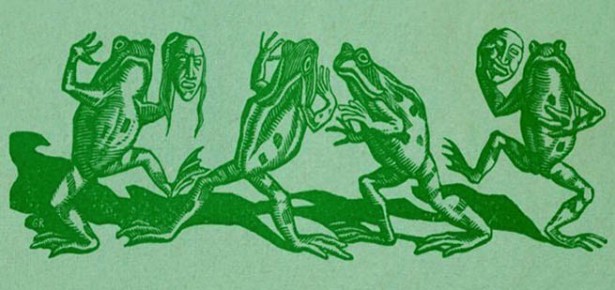
Woodcut of The Frogs by Gwen Raverat. Photo: Cambridge Greek Play Committee.
The second part of this year’s Cambridge Greek Play will be a stripped-down version of one of the most famous of ancient Greek comedies, Aristophanes’ Frogs from 405 BCE. The brief has been to produce 45 minutes of high-tempo humour from the play. As a classicist watching the creatives at work, I’ve seen more clearly than ever quite how delicate a business translating comedy has to be.
Of course, ‘translation’ can amount to different things. First, translating words. Aristophanes has plenty of situations which stay funny with in a fairly literal version. In the opening scene of Frogs, effeminate Dionysus and his long-suffering slave Xanthias visit the macho Heracles. The following exchange has a still familiar punchline:
Heracles: So you were in the sea-battle?
Dionysus: Yes, and we sank twelve or thirteen enemy ships.
Heracles: You two?!
Dionysus: I swear to it.
Xanthias: And then I woke up! (Frogs lines 49-51)
Unfortunately, puns tend not to work when literally translated. One option here is to negotiate: I’m going to lose a Greek pun at line A, but I can create an English one at line B. Frogs features Charon, the ferryman of the dead, giving various nautical instructions as he arrives in his boat. Aristophanes didn’t know the phrase ‘avast behind!’, but he does pun on his actors’ appearance, and so might have approved of a heavily padded-out comic actor saying this as he bends his vast behind towards the audience. In this method of translating, you win some, you lose some, and you can capture more of the spirit with a slight loosening of the relationship to what Aristophanes originally composed.
Greek theatre involved not only words, but stage-business and music. The first thing Aristophanes’ audience saw was two males, one wearing a long yellow dress with a lion-skin over it, and the other sitting on a donkey while carrying a massive knapsack. This incongruous sight is intrinsically silly. But a designer can also translate it, by finding the modern equivalents of sensuous, effete menswear (Dionysus’ yellow dress), of Heracles’ macho lionskin, and of the donkey used as transport for heavy loads. Now comes a further problem if you’re performing the ancient Greek text with English surtitles, as we are doing: if you want to turn the donkey into an airport trolley, which lines containing the word for ‘donkey’ do you have to cut, and are those deviations acceptable for the benefits reaped?
The latter half of Frogs involves a squabble between two dead tragedians – bombastic Aeschylus and the younger, glibber Euripides – over the Underworld’s throne of poetry. During this, each poet parodies the other’s poetic and musical technique. Here being ‘authentic’ is a non-starter since we know almost nothing about Greek music, and in any case the parodies wouldn’t be funny for a modern audience: you really have to update. But the basic terms of the situation are difficult to match: who now can be caricatured, like Euripides, as both musically avant-garde and intellectually superficial? Incidentally, in the 1947 Cambridge Greek Play production of Frogs, the surprisingly up-to-date musical parodies were of Showboat and rumba.
The greatest insight I’ve gained from watching this production come together is how translation and mistranslation can be used as an extra theatrical medium for humour, and one (like a wordless slapstick sequence) which is easily compatible with our principle of speaking the original Greek verses. The surtitles, which all our audience-members will have to use, can give the impression that the surtitler is translating in real time and has just got stuck, fallen asleep, broken the machine, and so on; or one can parody the heavily footnoted ‘translationese’ which some old-fashioned versions of Greek drama adopted.
In this production of Frogs you’ll find plenty of approaches to translation on show: expect cameos from modern politicians, medleys of night-club classics, Kermit, a red-faced surtitler – and maybe a knock-knock joke too.
Have a read of the first part of Dr Thomas article, on Prometheus.
Frogs will be performed in Greek with English surtitles at Cambridge Arts Theatre on October 16-19, tickets can be found at www.cambridgeartstheatre.com, info at www.cambridgegreekplay.com.
Latest Comments
Have your say!